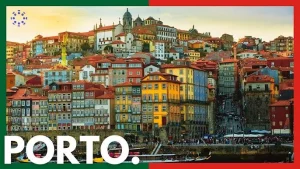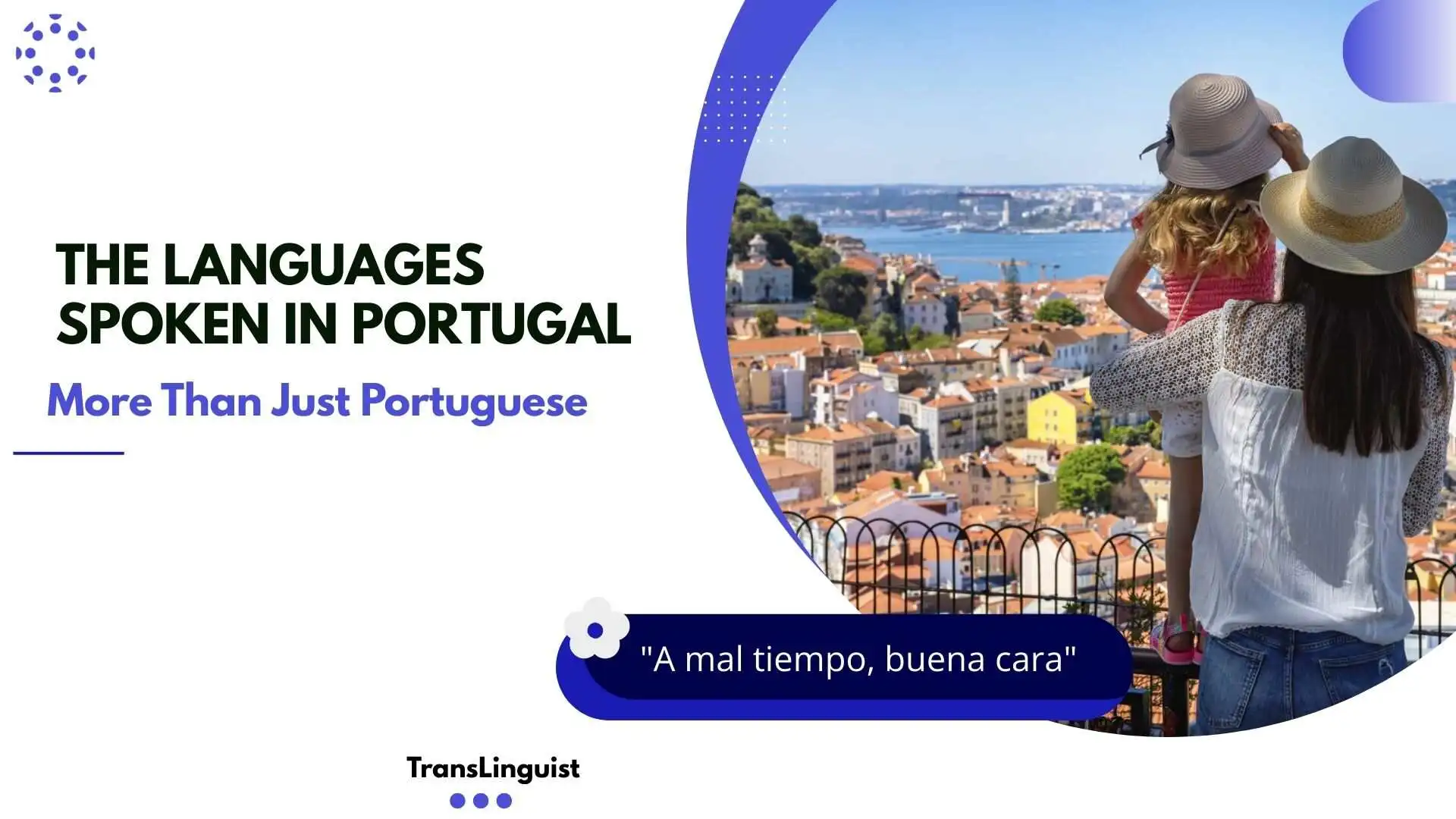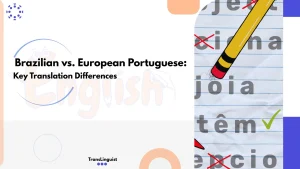People often say that everyone in Portugal speaks Portuguese—and they’re not wrong. It’s the country’s official language, heard everywhere from schools to government offices, TV, and daily life. But if you settle outside major cities like Lisbon or Porto, you’ll quickly notice that Portuguese isn’t as uniform as it seems. The languages of Portugal—or rather, the dialects and regional variations—can differ significantly from place to place. Accents shift, sometimes even between neighboring towns, and words don’t always mean the same thing everywhere. A phrase that’s perfectly normal in Lisbon might draw confused looks in the north or south—or worse, lead to a total misunderstanding.
And then there’s how people talk. Some speak fast—really fast—dropping syllables and blending words until catching anything feels nearly impossible. When locals launch into half an hour of rapid jargon, it might as well be a different language, even though it’s all Portuguese. This is where language services-Portuguese expertise becomes invaluable, especially with regional dialects like Alentejano in the south. To the untrained ear (and even to some native speakers), it barely resembles the Portuguese spoken in the north—words tumble together, pronunciations shift, and the rhythm turns conversations into puzzles. For businesses or travelers relying on language services-Portuguese, these nuances highlight why professional translation or localization isn’t just helpful but often essential.
Then there’s Mirandês. That’s spoken in a small area near Spain. It’s not just an accent or a dialect, it’s its own language. It has different grammar and words. If you hear someone speaking it, you might not recognize much at all. Seriously, it’s not just slightly different, it’s its own thing. And guess what? The government actually recognizes it as an official minority language.
Not All Portuguese Sounds the Same
- The national language is Portuguese. It is used everywhere in their schools, media, and government.
- European Portuguese sounds different from Brazilian Portuguese. Or Angolan Portuguese. Words get stressed differently, some slang doesn’t translate well, and certain expressions can confuse even native speakers from other countries.
- Also, there’s sign language, Portuguese Sign Language, called LGP. It’s officially recognized and used by parts of the deaf community.
- Some regional dialects and minority languages are being preserved too, like Mirandese, which has its own vocabulary and grammar. There are radio stations and cultural groups trying to keep it alive, and some schools even teach it now.
- So while Portuguese is the main language, it’s not the only one, not by a long shot.
- And while Portuguese is the main act, it’s not the only one.
- Did you know that there are over half a dozen regional dialects across the country? Not to mention minority languages, immigrant tongues, and even an officially recognized sign language.
- It’s safe to say that Portugal speaks in more voices than most people expect.

Officially Portuguese, Naturally Diverse
Portuguese just has a certain rhythm to it. Portuguese feels different when you hear it spoken. It’s not like English, where everything is short and fast. Portuguese has very expressive, and the right tone. People talk with feeling, like they really mean what they say. It’s not just about knowing the right words or grammar; it’s also about how you say it. Like your tone, or if you’re using your hands while talking.
A good example is “tu” vs. “você.” In some places, everyone uses “tu” all the time, even with bosses or teachers. But in other parts, people mostly use “você.” So yeah, it depends where you are.
The way Portuguese sounds is also kinda special. There are soft sounds, those rolling R’s, and nasal vowels that make it sound different from Spanish or French.
Portuguese is mostly phonetic. What you see is usually what you say. That’s a big help, especially compared to English, where words like “though” don’t even rhyme with themselves. But don’t let that fool you. Misplace the stress in a word, and you might accidentally insult someone. It’s one of those languages that sounds simple until you try to speak it out loud.
How People Speak Changes by Region
Some learn Portuguese at school; however, there are considerable divergences between what one learned and what one speaks in the streets, depending on geographical regions. In Trás-os-Montes, along the Spanish border, the accent is said to have an archaic quality, with the subliminal influence of Galician; whereas going south into Alentejo means a slower tempo with soft, lilting accents, and a fair share of dropped syllables; while in Algarve, the tempo is quirky and peppered with Arabic-influenced words from centuries back. These are more than just accents; these represent history, identity, and a particular sense of place.
Echoes of the Past: Minority Languages Still Alive
Portugal doesn’t have a ton of minority languages, but the ones it does have tell deep stories.
Take Mirandese, for example. Spoken in the village of Miranda do Douro, it’s not a dialect; it’s a full-on Romance language, related to Portuguese but shaped by Astur-Leonese and Castilian roots. It almost faded out, but in 1999, it got official status in its region. Now, it’s being taught in schools, heard on the radio, and used in daily life. It’s proof that even in a small country, old languages still matter not just as curiosities, but as living pieces of culture.
- Voices from Elsewhere: How Migration Changed the Soundscape
- Like any modern nation, Portugal’s linguistic landscape has changed with migration. Over the past few decades, new communities have added their voices to the mix.
- You’ll hear:
- Cape Verdean Creole in neighborhoods around Lisbon was brought by families from former colonies.
- Romanian and Ukrainian, increasingly common due to growing immigrant populations.
- English, widely spoken in cities, tourism hubs, and among younger generations.
- Spanish, naturally, given the shared border and the fact that many Portuguese understand it well, even if they pretend not to.
- French, German, and Italian, spoken by retirees and expats who’ve made Portugal their home.
- Walk through a market in Lisbon today, and you might hear Portuguese, Cape Verdean, Romanian, and English all in one conversation, no translation needed.
Speaking in Schools and Daily Life
In schools, Portuguese is the standard language naturally. In some schools, especially private ones or places with lots of foreigners, they’re starting to offer bilingual classes. I like teaching kids in both English and Portuguese. It is not the norm yet, but it is becoming increasingly common everywhere, especially in bigger cities or areas with a lot of expats living.
English is usually taught pretty early, at least in urban areas. But how good people get at it really depends. Some learn well in school, others pick it up from traveling, working jobs where they need English, or just watching videos online without subtitles.
People are also starting to care more about keeping local dialects and smaller languages alive. For example, there are radio stations that play stuff in Mirandese or festivals that celebrate old ways of speaking. It’s not huge yet, but it shows that Portugal is slowly recognizing that it has more than just one language.
What Language Really Shows About People
Language isn’t just about talking, you know? It is tied to who people are. In Portugal, language shows where someone is from, or something about their family background.
Like, you might hear an older person singing old songs in Trás-os-Montes, or see someone at a market switching between Portuguese and Spanish mid-conversation. Or maybe a Cape Verdean family using Creole at home and Portuguese when they’re out doing errands.
These little things help keep traditions alive. They also connect older and younger generations, even if people don’t always notice it. And languages aren’t fixed; they change all the time. Words get borrowed, accents shift, and new ways of speaking come up.
Everyone’s Voice Matters
Most people think Portugal only speaks Portuguese, which is kind of true, yeah. But there’s more going on than most realize. Different accents, dialects, and other languages all add something to what makes Portugal feel unique.
At TransLinguist, we think language is about more than just words. It’s how people connect, whether you’re traveling, working, or learning something new. We’re here to help you speak clearly, feel confident, and maybe even enjoy the conversation a little more.
FAQs
What are the top 3 languages in Portugal?
Portuguese, Mirandese, and Portuguese Sign Language.
Is Portuguese the only language spoken in Portugal?
No, there are regional dialects, and Mirandese, LGP, and several immigrant languages are also spoken.
What country speaks 70% Portuguese?
Brazilans Speaks Almost 70% Portuguese
How many languages are used in Portugal?
Portuguese, many dialects, Mirandese, LGP, and several immigrant languages.
How present is English in Portugal?
It is very much so, especially in cities and tourist areas.



